四、习语的翻译
英语成语与习语的翻译

英语idiom一词的语义范围可大可小。从广义上来说, idiom泛指一种民族语言中所有的惯用语和特殊表达方式。 如英语口语中的“What is he?”并不像字面的意义“他 是什么?”,而是英语中习惯用这句话来询问“他是干 什么(工作)的?”。我们这里要讨论的英语成语是狭 义范围的“idiom”,指的是英语中长期以来习用的、表 达完整意义的、结构定型的固定词组或短语。
第8讲
英语成语翻译
一、英语成语概述
Ⅰ. 什么是英语成语 英语以成语(idiom)丰富而著称,而且种类繁多。从严格意
义上来说,英语成语既不属于词汇的范畴,也不属于语 法的范畴,它本质上是一种“语言习惯”,是语言在长 期的运用过程中在句法、词汇和语义方面所形成的特点, 无理据可言。这种语言习惯,不但因语言不同而相异, 就是同一种语言也会随着时代的发展而变化。在莎士比 亚时代,人们普遍认同这样的疑问句式(“Like you this?”) 和否定句式(“I like it not.”),
Ⅱ. 英语成语的来源
英语成语以其精练、短小、幽默、风趣且富于哲理性的特 征而广泛地被英、美国家的人们所接受并应用于日常生 活交际之中。作为传承、记载文化与语言的基本工具之 一,它在英、美国家人们的日常生活中起着举足轻重的 作用。但是,从另一个角度而言,成语的产生与存在受 其特有的历史文化背景所制约,并在一定程度上折射出 特定地域、特定历史时期、特定民族所特有的民俗、民 风等文化信息。成语之所以难懂的根本原因就在于它本 身具有浓郁的、独特的地域民族文化色彩。
to the manner born(与生俱来的)出自莎士比亚的名作 《哈姆雷特》,而pond of flesh(合情但悖于情理的要
求)则出自莎士比亚的另一部作品《威尼斯商人》; man Friday(忠仆、得力助手)也有根有据,那就是丹 尼尔·笛福(Daniel Defoe)的《鲁滨逊漂流记》。又如: Brevity is the soul of wit. (Shakespeare)(言以简为 贵);A little learning is a dangerous thing. (Pope)(一 知半解是危险的);Live not to eat, but eat to live. (Franklin)(活着不是为了吃饭,吃饭是为了活着); Knowledge is power. (Bacon)(知识就是力量)。
30个习语的英文翻译

30个习语的英文翻译English Translations of Chinese Idioms1. No shame in asking questions, even topeople of lower status.不耻下问。
2. No one knows a son better than the father.知子莫若父。
3. Three humble shoemakers' brainstormingwill make a great statesman. 三个臭皮匠,赛过诸葛亮。
4. Kill a chicken before a monkey.杀鸡儆猴。
5. Too many cooks spoil the broth.人多反误事。
6. No wind, no waves.无风不起浪。
7. Lift a stone only to drop on your own feet.搬起石头砸自己的脚。
8. A camel standing amidst a flock of sheep.9. An inch of time is an inch of gold but youcan't buy that inch of time with an inch ofgold.一寸光阴一寸金,寸金难买寸光阴。
10. Only when all contribute their firewoodcan they build up a strong fire.众人拾柴火焰高。
11. An ant may well destroy a whole dam.千里之堤毁于蚁穴。
12. One cannot refuse to eat just becausethere is a chance of being choked.因噎废食。
13. If a son is uneducated, his dad is toblame.子不教,父之过。
(完整版)Ⅷ.习语、谚语、俗语、诗句的翻译.
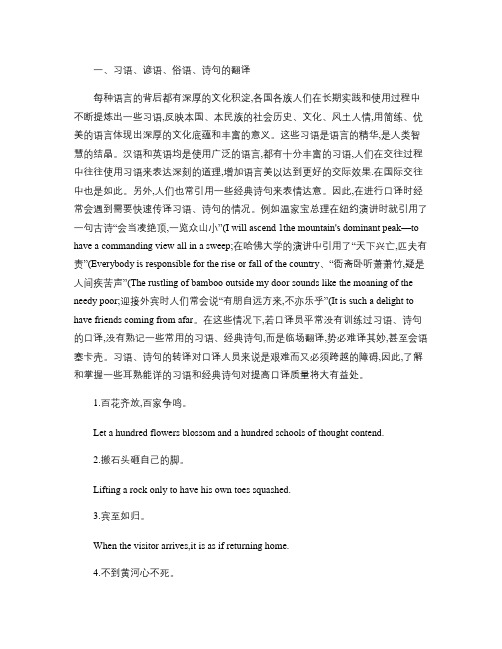
一、习语、谚语、俗语、诗句的翻译每种语言的背后都有深厚的文化积淀,各国各族人们在长期实践和使用过程中不断提炼出一些习语,反映本国、本民族的社会历史、文化、风土人情,用简练、优美的语言体现出深厚的文化底蕴和丰富的意义。
这些习语是语言的精华,是人类智慧的结晶。
汉语和英语均是使用广泛的语言,都有十分丰富的习语,人们在交往过程中往往使用习语来表达深刻的道理,增加语言美以达到更好的交际效果.在国际交往中也是如此。
另外,人们也常引用一些经典诗句来表情达意。
因此,在进行口译时经常会遇到需要快速传译习语、诗句的情况。
例如温家宝总理在纽约演讲时就引用了一句古诗“会当凌绝顶,一览众山小”(I will ascend 1the mountain's dominant peak—to have a commanding view all in a sweep;在哈佛大学的演讲中引用了“天下兴亡,匹夫有责”(Everybody is responsible for the rise or fall of the country、“衙斋卧听萧萧竹,疑是人间疾苦声”(The rustling of bamboo outside my d oor sounds like the moaning of the needy poor;迎接外宾时人们常会说“有朋自远方来,不亦乐乎”(It is such a delight to have friends coming from afar。
在这些情况下,若口译员平常没有训练过习语、诗句的口译,没有熟记一些常用的习语、经典诗句,而是临场翻译,势必难译其妙,甚至会语塞卡壳。
习语、诗句的转译对口译人员来说是艰难而又必须跨越的障碍,因此,了解和掌握一些耳熟能详的习语和经典诗句对提高口译质量将大有益处。
1.百花齐放,百家争鸣。
Let a hundred flowers blossom and a hundred schools of thought contend.2.搬石头砸自己的脚。
汉语习语的翻译

例 句
闰土来了⋯项上套一个明晃晃的银项圈,这可见他 的父亲十分爱他,怕他死去,所以在神佛面前许下 心愿,用圈子将他套住了。(鲁迅《故乡》)
Run-tu had come ⋯ a gleaming silver necklet round his neck, showing that his father doted on him and, fearing he might die, had made a pledge with the gods and Buddhas, using the necklet as a talisman.
她怕碰一鼻子灰,话到了嘴边,又把它咽了下去。 She was afraid of being snubbed,so she swallowed the words that came to her lips.
套 用
有的英语谚语和汉语谚语在内容和形式上都 相符合,双方不但有相同的意义和修辞色彩, 并且有相同或大体相同的形象比喻,在英译 汉时我们遇到这种情况,不妨直截了当地套 用汉语的同义谚语,这样既保留了谚语的形, 又传达了谚语的神。 Walls have ears. 隔墙有耳。
直译法
千里送鹅毛,礼轻情意重。 The gift itself maybe as insignificant as a goose feather,but sent from afar,“conveys deep feelings.
他是不到黄河不死心。 He would not stop until he reached the Yellow River---to give up until his hope has gone.
例句
你要爱他(她),不值什么,我拿平儿换了他 (她)来好不好?那薛老大也是“吃着碗里瞧 着锅里”的„„
习语的翻译

(be) famous / well-known (be) accessible/approachable (be) easy to get along with
3. 开卷有益。
Chinese meaning:
______________ 读书有益(于我们)
集邮集币其乐无穷。(collect)
It has an endless enjoyment to collect stamps and coins. It is joyful to collect stamps and coins.
由于粗心大意,汤姆错过了这个机会。 (miss)(98高考)
It is obvious ( / apparent / clear/ distinct / evident) that … Obviously, /Apparently, / Clearly, / Distinctly, /Evidently, …
3. 感激涕零,不胜感激
Thank you very much for … I’m grateful / thankful / obliged to you for… I appreciate one’s doing…
科学家们投身工作时常常废寝忘食。 (devote)
The scientists often neglect sleep and meals because of being devoted to work.
政府费了九牛二虎之力维护生态平衡。 (balance)
1.The government maintained / kept the ecological balance with tremendous efforts. 2.It took the government a lot of effort to maintain / keep the ecological balance .
习语的翻译
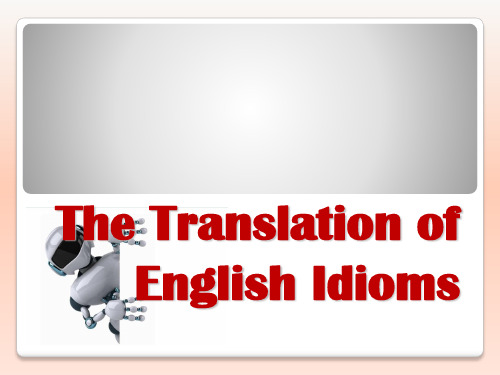
Conclus,即采用直译、释义、套译 和意译等方法使得译文不仅仅在字面上与原文对等, 在含义、褒贬作用、情感色彩等方面相当。 2.要懂得如何根据习语的特点灵活运用这些翻译技巧。 3.翻译时要越过社会文化差异的障碍,译出能使读者 产生与原文相同效果的译文。
习语在语言上具有精辟、生动、优美、形象、 通俗、寓意深刻等特点。因此,正确理解、确切 翻译英汉习语,对于我们学习和使用英语的人来 说是十分必要,也是必不可少的。
1.直译法 (Literal Translation)
直译法大致相当于异化译法 ,即不违背译文
语言规范,不引起错误联想,能保持英语习语的
Practice makes perfect. 熟能生巧。
Seeing is believing. 眼见为实。
Diamond cut diamond. 强中更有强中手。
Give him an inch and he’ll take an ell. 得寸进尺。 A lame traveler should get out bedtimes. 笨鸟先飞。 Beauty is in the eye of the beholder. 情人眼里出西施。 He spent money like water. 他花钱如流水似的。 An idle youth,a needy age. 少壮不努力,老大徒伤悲。 While there is life, there is hope. 留得青山在,不怕没柴烧。
4.意译法 (Free Translation)
意译法就是忠实于原文的内容,又不拘泥于 原文的形式而采用的按原文意思翻译的一种译法。 意译法也属于归化译法。 英语中有些习语无法直译或直译后使人无法 理解,在汉语中又找不到同义对等的习语套译, 也不能再现英语的表达形式,这时只有放弃原文 习语的形象和风格,根据上下文,灵活地传达原 作的内容。
中国文学外译与翻译策略的选择
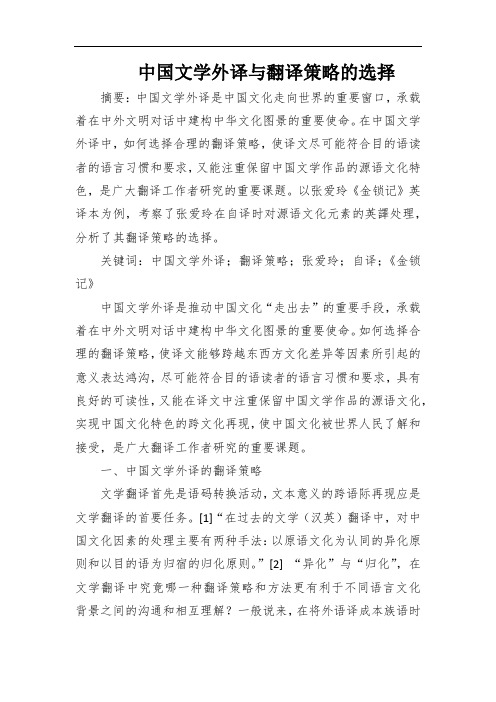
中国文学外译与翻译策略的选择摘要:中国文学外译是中国文化走向世界的重要窗口,承载着在中外文明对话中建构中华文化图景的重要使命。
在中国文学外译中,如何选择合理的翻译策略,使译文尽可能符合目的语读者的语言习惯和要求,又能注重保留中国文学作品的源语文化特色,是广大翻译工作者研究的重要课题。
以张爱玲《金锁记》英译本为例,考察了张爱玲在自译时对源语文化元素的英譯处理,分析了其翻译策略的选择。
关键词:中国文学外译;翻译策略;张爱玲;自译;《金锁记》中国文学外译是推动中国文化“走出去”的重要手段,承载着在中外文明对话中建构中华文化图景的重要使命。
如何选择合理的翻译策略,使译文能够跨越东西方文化差异等因素所引起的意义表达鸿沟,尽可能符合目的语读者的语言习惯和要求,具有良好的可读性,又能在译文中注重保留中国文学作品的源语文化,实现中国文化特色的跨文化再现,使中国文化被世界人民了解和接受,是广大翻译工作者研究的重要课题。
一、中国文学外译的翻译策略文学翻译首先是语码转换活动,文本意义的跨语际再现应是文学翻译的首要任务。
[1]“在过去的文学(汉英)翻译中,对中国文化因素的处理主要有两种手法:以原语文化为认同的异化原则和以目的语为归宿的归化原则。
”[2] “异化”与“归化”,在文学翻译中究竟哪一种翻译策略和方法更有利于不同语言文化背景之间的沟通和相互理解?一般说来,在将外语译成本族语时大多数译者会习惯性地采用归化,而将本族语译成外语时则往往选择异化。
其实,“‘归化和‘异化各有其长,亦各有其短。
”[2] “应该说,翻译中‘归化和‘异化不仅是不矛盾的,而且是互为补充的。
文化移植需要多种方法和模式。
”[3]因此,在文学翻译中应该合理选择、灵活运用这两种策略。
二、张爱玲《金锁记》英译本的翻译策略选择张爱玲是中国现代文学史上一位才华横溢的双语作家和翻译家,《金锁记》是其最重要的代表作之一,著名文学评论家夏志清先生在《中国现代小说史》一书中称其为“中国自古以来最伟大的中篇小说”[4]。
习语翻译
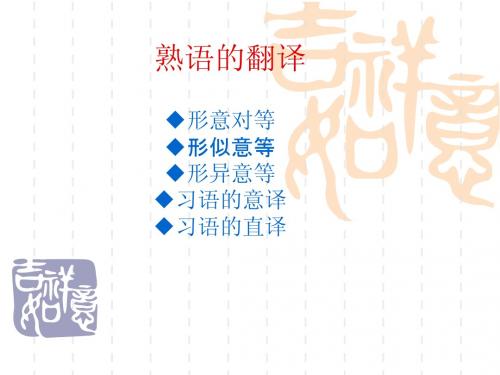
今回はここで終わり! みなさん、頑張ってね!
青天の霹靂 支離滅裂 薄利多売
良药苦口
良薬は口に苦し
归心似箭
喜出望外 势如破竹 家常便饭 入乡随俗
帰心矢の如し
望外の喜び 破竹の勢い
远亲不如近邻
遠い親類より近い他人
有其父必有其子 日常茶飯事 郷に入っては郷に従え この親にしてこの子あり
3.形异意等的熟语
人に迷惑をかけても澄ました顔をしている
现在我们的古典文学研究中为了某一
古人的一件无甚意义的琐事,花费大 量的精力、时间去考证,甚至进行无
休止的争论,实在是小题大做。
現在、私たちの古典文学研究において
は、古人の意味もない些細なことのため に多くのエネルギーと時間を費やして考
証し、そのあげく際限のない論争をする
天壤之别:天地の差、月とすっぽん、雲泥の差
五十步笑百步:五十歩百歩の違い、五十歩百歩、目 糞鼻糞を笑う、猿の尻笑い 虎视眈眈: 虎视眈眈地寻找着攻击的机会
虎視眈々と攻撃のチャンスをねらう
各家商社都虎视眈眈地寻找抢手商品
各商社は鵜(う)の目鷹(めたか)の目(め)で売れ筋商品 をさがしている
今回の試験は自分に対して自信が持てず、
失敗したら面目がないと心配だったので、事
前に騒ぐ勇気がなかったのです。それが目の
見えない猫が死んだねずみにぶつかるような
もので、思いがけず幸運にも合格したのです。
本当に不可思議です。 棚から牡丹餅 碰运气考上了 まぐれあたりで合格する/
俗话说:“人靠衣服马靠鞍”。恰到好处
ら、僕らのほうは霞を食って生きろとでも言うのか
い!?」夫婦は口論を始めた。姑はそれを聞いて火 に油を注いだように怒り、あげくの果て、家中誰もって生きると信じられた ことから〕俗世間を超越して生きる。
习语的六种翻译方法
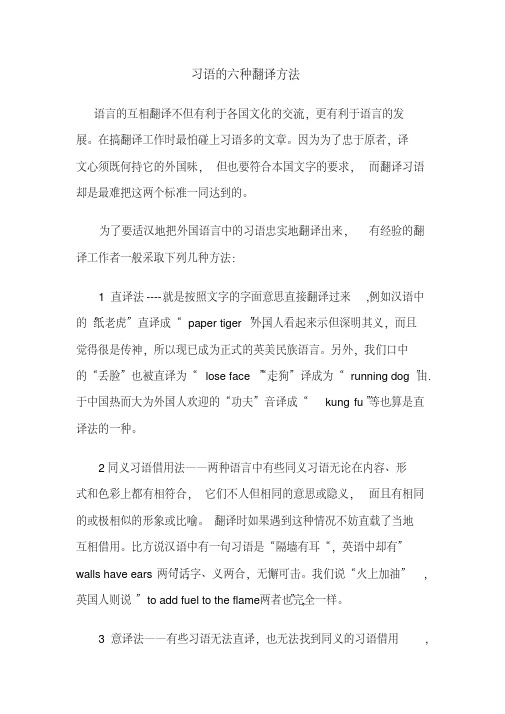
习语的六种翻译方法语言的互相翻译不但有利于各国文化的交流,更有利于语言的发展。
在搞翻译工作时最怕碰上习语多的文章。
因为为了忠于原者,译文心须既何持它的外国味,但也要符合本国文字的要求,而翻译习语却是最难把这两个标准一同达到的。
为了要适汉地把外国语言中的习语忠实地翻译出来,有经验的翻译工作者一般采取下列几种方法:1直译法----就是按照文字的字面意思直接翻译过来,例如汉语中外国人看起来示但深明其义,而且的“纸老虎”直译成“paper tiger”,觉得很是传神,所以现已成为正式的英美民族语言。
另外,我们口中由“走狗”译成为“running dog”.的“丢脸”也被直译为“lose face”,于中国热而大为外国人欢迎的“功夫”音译成“kung fu”等也算是直译法的一种。
2同义习语借用法——两种语言中有些同义习语无论在内容、形式和色彩上都有相符合,它们不人但相同的意思或隐义,面且有相同的或极相似的形象或比喻。
翻译时如果遇到这种情况不妨直载了当地互相借用。
比方说汉语中有一句习语是“隔墙有耳“,英语中却有”两句话字、义两合,无懈可击。
我们说“火上加油”,walls have ears”,两者也完全一样。
英国人则说”to add fuel to the flame”,3意译法——有些习语无法直译,也无法找到同义的习语借用,则只好采用意译的方法来对待.例如汉语中的”落花流水”用来表示被。
“乌烟瘴气“形打得大败之意,译成英文便是“to bi shattered to pieces”容情形混乱不堪,可用“chaos”来表达。
4省略法—汉语中有一种情况,就是习语中有的是对偶词不达意组,前后含意重复。
偶到这种情况时可用省略法来处理,以免产生画蛇添足之感。
例如“铜墙铁壁”可译成“wall of bronz l” 已经足够,街谈巷议“在意义上也是实在无须说成”wall pf klckopper and iron”.”便可以了。
汉语习语的翻译(第四章)
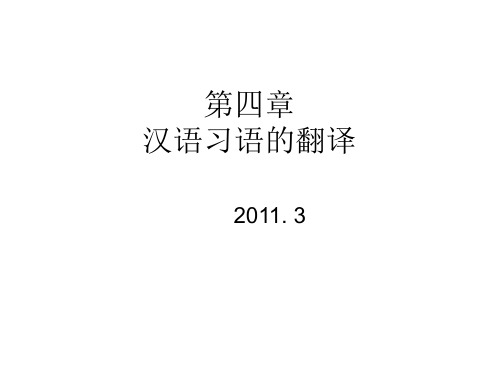
laugh in one’s face 当面嘲笑 lay sth to heart 把某事放在心上 have pity on sb. 同情某人 • To show one’s cards摊牌 • golden age黄金时代 • Kill two birds with one stone. • 一石二鸟,一举两得
• • • • •
dig one‘s own自掘坟墓 a thorn in the flesh 肉中刺、眼中钉 Blood is thicker than water.血浓于水。 The open-door policy 门户开放政策 the most-favoured-nation clause 最惠 国条款 • the position-of-strength policy 实力地 位政策 • shuttle diplomacy 穿梭外交 • Easy come easy go.来的容易去的快
•
• • •
用直译法翻译习语,既可以保留习语具有 的民族、地方、历史等色彩,又有助于不 断地从外国引进一些新鲜生动的词语、句 法结构和表达方法等,从而丰富译文的语言。 例如: 1) Hitler was armed to the teeth when he launched the Second World War, but in a few years, he was completely defeated. 希特勒在发动第二次世界大战时是武装到 牙齿的,可是不过几年,就被彻底打败了。 这里的习语"armed to the teeth"形象生动, 一直都译为"武装到牙齿",已用得很习惯 了;如意译为"全副武装",语气反而变弱。
• 由于习语具有这些特点,翻译时就要尽量保持 这些特点。译者除了忠实地表达原文习语的意 义外,还应尽可能保持原文习语的形象比喻、 丰富联想、修辞效果以及其民族、地方特色等。 习语不仅大量出现在文艺作品里,在政治和科 学论文中也同样经常遇到。习语翻译的好坏对 整个译文的质量有直接的影响。因此,如何处 理习语是翻译中的一个极为重要的问题。从广 义上讲,习语包括俗语(colloquialisms)、谚 语(proverbs)、俚语(slang expressions)、成语 (set phrases) 、歇后语(enigmatic folk similes) 、典故(allusions)、格言(sayings)、 惯用语等。首先介绍英语习语及其翻译。
习语的翻译(汉英)

3. 意译法: 牺牲形象, 割舍文化因子
胸有成竹 To have a well-thought-out经过周详之考虑的 plan before doing sth 桃李满天下 To have students all over the world 叶公好龙 Professed love of what one really fears 东施效颦 Crude imitation with ludicrous荒谬的effect 南柯一梦 A fond dream or illusory joy 四面楚歌 To be besieged on all sides
改变形式的五个条件
直译会导致意义上的错误时; 引入外来语形成语义空白(Semantic Zero),读者有可能自己填入错误的意 义时; 形式对等引起严重的意义晦涩时; 形式对等引起作者原意所没有的歧义时; 形式对等违反译入语的语法或文体规范 时。
习语汉译英的原则
形象性原则 简练性原则 不可滥用字面意义直译法 尽量少用意译法和直译加注法
•掌上明珠 •A pearl in the palm •The apple of one’s eye •守口如瓶 •To keep one’s mouth closed like a bottle •To keep a still tongue in one’s head •雪中送炭 •To send charcoal in snowy weather •To help a lame dog over stile横路栅栏 •画蛇添足 •To draw a snake and add feet to it •To paint the lily
3)不借用形象或比喻的, 可放心借用 迂回曲折 twists and turns 断断续续 off and on 乱七八糟 at sixes and sevens 挖空心思 to rack one’s brains 针锋相对 to give tit for tat
研究生英语读写译教程1-18 单元 翻译练习答案
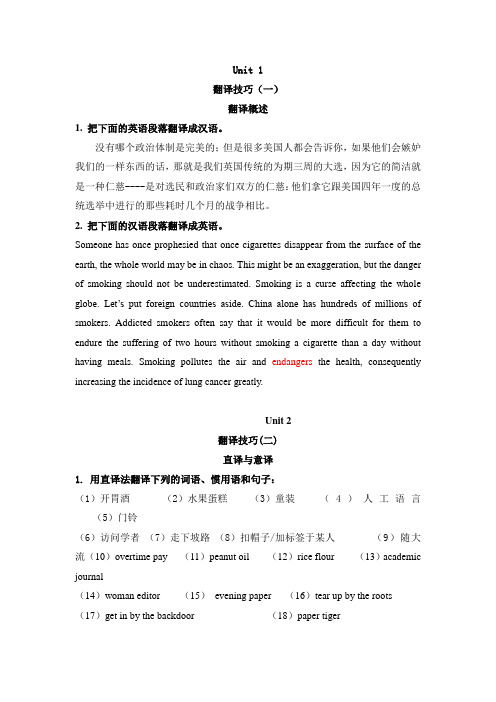
Unit 1翻译技巧(一)翻译概述1.把下面的英语段落翻译成汉语。
没有哪个政治体制是完美的;但是很多美国人都会告诉你,如果他们会嫉妒我们的一样东西的话,那就是我们英国传统的为期三周的大选,因为它的简洁就是一种仁慈----是对选民和政治家们双方的仁慈:他们拿它跟美国四年一度的总统选举中进行的那些耗时几个月的战争相比。
2. 把下面的汉语段落翻译成英语。
Someone has once prophesied that once cigarettes disappear from the surface of the earth, the whole world may be in chaos. This might be an exaggeration, but the danger of smoking should not be underestimated. Smoking is a curse affecting the whole globe. Let’s put foreign countries aside. China alone has hundreds of millions of smokers. Addicted smokers often say that it would be more difficult for them to endure the suffering of two hours without smoking a cigarette than a day without having meals. Smoking pollutes the air and endangers the health, consequently increasing the incidence of lung cancer greatly.Unit 2翻译技巧(二)直译与意译1. 用直译法翻译下列的词语、惯用语和句子:(1)开胃酒(2)水果蛋糕(3)童装(4)人工语言(5)门铃(6)访问学者(7)走下坡路(8)扣帽子/加标签于某人(9)随大流(10)overtime pay (11)peanut oil (12)rice flour (13)academic journal(14)woman editor (15)evening paper (16)tear up by the roots (17)get in by the backdoor (18)paper tiger(19) 必须注意到,电流是与每次电阻减小成比例地增加的。
习语的翻译

一、 什么是习语(idiom)
习语是经过长时间的使用而提炼出来的固定短语或短句,是人民智慧的 结晶。习语大都具有鲜明的形象,适宜于用来比喻事物,因而往往带有浓厚的 民族色彩和地方色彩。习语既是语言中的重要修辞手段,同时其本身也是各种 修辞手段的集中表现。因此,翻译时应当尽量保持这些特点。译者除了忠实地 表达原文习语的意义外,还应尽可能保持原文习语的形象比喻、丰富联想、修 辞效果以及其民族、地方特色等。
❖ 长时间的使用 ❖ 固定短语或短句 ❖ 鲜明的形象 ❖ 浓厚的民族色彩和地方色彩
❖ 俗语(Colloquialisms)
英语习语
(Idioms)
❖ 谚语(Sayings) ❖ 俚语(Slang expressions)
❖ The new naval(海军的) base has proved to be a white elephant;
她生长在富贵之家,认为凡事都可随心所欲。
三 小结
❖ 习语不仅是语言的精华,而且是语言的缩影,是语 言特征的集中反映:语言是人在劳动中创造的,大 部分习语就来自普通老百姓的生产活动和生活经历。 由于不同民族之间既存在相同的生产生活经历,也 存在不同的方面,因而,中英文习语中就存在意义 和形式完全相同的习语,也存在意义和形式不同的 习语。所以在翻译英语习语的时候,应该恰当地运 用直译,意译和套用汉语同义习语等方法,以保证 译文质量。
❖ (2)双方有大体相同的形象比喻:
英汉两种语言都有丰富的习语,其中 有许多是同义的或近义的,但由于它们是 在不同的社会地域环境中的两种不同的生 活经验的产物,有许多习语就会显著地表 现出两种不同的民族形式。例如:汉语中 常用“雨后春笋”来形容“事物的迅速发 展和大量产生”,英语中的同义习语是 “like mushrooms”。
常见四字词语习语翻译
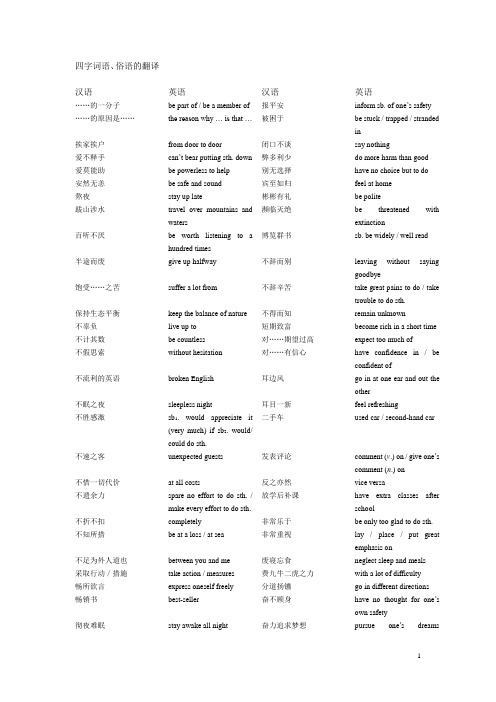
四字词语、俗语的翻译汉语英语汉语英语……的一分子be part of / be a member of 报平安inform sb. of one’s safety ……的原因是……the reason why … is that … 被困于be stuck / trapped / strandedin挨家挨户from door to door 闭口不谈say nothing爱不释手can’t bear putting sth. down 弊多利少do more harm than good爱莫能助be powerless to help 别无选择have no choice but to do安然无恙be safe and sound 宾至如归feel at home熬夜stay up late 彬彬有礼be polite跋山涉水travel over mountains andwaters 濒临灭绝be threatened withextinction百听不厌be worth listening to ahundred times博览群书sb. be widely / well read半途而废give up halfway 不辞而别leaving without sayinggoodbye饱受……之苦suffer a lot from 不辞辛苦take great pains to do / taketrouble to do sth.保持生态平衡keep the balance of nature 不得而知remain unknown不辜负live up to 短期致富become rich in a short time 不计其数be countless 对……期望过高expect too much of不假思索without hesitation 对……有信心have confidence in / beconfident of不流利的英语broken English 耳边风go in at one ear and out theother不眠之夜sleepless night 耳目一新feel refreshing不胜感激sb1. would appreciate it(very much) if sb2. would/could do sth.二手车used car / second-hand car不速之客unexpected guests 发表评论comment (v.) on / give one’scomment (n.) on不惜一切代价at all costs 反之亦然vice versa不遗余力spare no effort to do sth. /make every effort to do sth. 放学后补课have extra classes afterschool不折不扣completely 非常乐于be only too glad to do sth. 不知所措be at a loss / at sea 非常重视lay / place / put greatemphasis on不足为外人道也between you and me 废寝忘食neglect sleep and meals采取行动/措施take action / measures 费九牛二虎之力with a lot of difficulty畅所欲言express oneself freely 分道扬镳go in different directions畅销书best-seller 奋不顾身have no thought for one’sown safety彻夜难眠stay awake all night 奋力追求梦想pursue one’s dreamsearnestly沉默寡言with few words 付出代价do sth. at (great) cost pay (ahigh) price for呈现新貌take on a new look 付诸实施put into practice充耳不闻turn a deaf ear to 负债累累be in heavy debt充分利用make full use of 高度赞扬speak highly of抽出时间set aside some time 高薪工作high-paid job愁眉不展be worried about 各行各业all walks of life出尔反尔break one’s promise 给出答复give sb. a reply出国进修go abroad for further study 跟上……步伐keep pace with出乎意料out of one’s expectation /unexpectedly更不要说let alone出事地点the scene of the accident 鼓足勇气screw up / get up one’scourage吹毛求疵be particular about / findfault with 固执己见stick to one’s opinionstubbornly吹嘘boast about 刮目相看look at sb. with new eyes 从……判断judging from / by 关心生活质量be concerned about the lifequality从失败中吸取教训learn a lesson from one’sfailure光天化日in broad daylight粗略了解get a rough idea of 归根结底after all粗心大意be careless to do 归咎blame sb. for sth. / blamesth. on sb.错失良机miss the golden chance 毫不费力without any difficulty /without effort / effortlessly 打从心底里from the bottom of one’sheart号召call on sb. to do sth.打破记录break the records 合胃口to one’s taste大失所望be greatly disappointed with 合作cooperate with大相径庭/截然不同be totally different 忽然大笑burst out laughing / burstinto laughter代代相传pass down from generationto generation 化险为夷succeed in turning dangerinto safety代替replace A with B / substituteA for B欢欣鼓舞be happy and encouraged淡泊名利be not interested in fameand health缓解压力relieve pressure / stress导致(原因)lead to / cause /bring about / result in(结果)焕然一新take on a new look低碳生活low-carbon life 灰心lose heart抵御……的诱惑resist the t emptation of … 回心转意change one’s mind鼎力相助do whatever one can to help 昏迷不醒remain unconscious独居老人old people who live alone 活在……阴影中live in the shadow of独立思考think independently 获悉on hearing读懂心思read one’s thoughts 积极参加take an active part in纪念in memory of 满腔热情的enthusiastic家喻户晓be known to everyhousehold盲目blindly价廉物美be cheap and have goodquality没有……可能be free from尖子生top student 每况愈下go from bad to worse坚持不懈/孜孜不倦persevere in doing sth. 梦寐以求one has always beendreaming of坚如磐石as solid as a rock 密友/闺蜜close / intimate friends坚守岗位stick to one’s post 名副其实/不负盛名live up to one’s reputation 艰苦奋斗(n.)hard work 名胜古迹places of interest andhistorical sites减轻负担relieve sb. of sth. 明辨是非distinguish right fromwrong佼佼者outstanding people 冥思苦想think hard节约用水save water 默默无闻without attracting publicattention劫富济贫rob the rich to help the poor 谋生earn one’s living竭尽所能/全力以赴do / try one’s best to do 某人兴奋的不能自已be too excited to calmoneself down解乏recover from tiredness 某人一无是处sb. be good for nothing介入/卷入be involved in 目不转睛keep one’s eyes fixed on金科玉律golden rule 目光短浅的be short-sighted筋疲力尽be tired out / be worn out /be exhausted难以言表more than one can say进入视野come into one’s sight 年纪相仿about one’s age经受时间的考验stand the test of time 蹑手蹑脚be on one’s tiptoe / tiptoe(v.)惊讶不已be amazed / surprised at 宁死不屈would rather die than giveup精力充沛energetically 抛开分歧put aside one’s differences 精神食粮spiritual food / food forthought陪伴keep … company就……而言in terms of 配角 a minor part就业困难have difficulty in finding ajob碰见/不期而遇come across / bump into举世瞩目attract worldwide attention 偏远山区remote mountain(ous) area聚精会神/全神贯注focus / concentrate (one’smind) on 拼搏strive for sth. / strive to dosth.绝佳机会offer … an excellent chance 平白无故for no reason开/闭幕式opening / closing ceremony 迫不及待can hardly wait to do开夜车burn the midnight oil 旗鼓相当be equal to科学进步(n.)the advance / progress ofscience千篇一律follow the same pattern克服暂时困难overcome the temporarydifficulty 千载难逢的机会 a rare / once-in-a-lifetimechance空气污染air pollution 牵着鼻子走lead sb. by the nose 拉上窗帘draw the curtains 翘首以盼look forward to来龙去脉the whole story of 惬意agreeable / pleasant劳逸结合keep the balance betweenwork and relaxation 情不自禁can’t help doing / can’t helpbut do老大不小sb. be no longer a child 区分/分辨tell A and B老老少少the old and the young /people of all ages 取得成就make (great) achievementsin冷不丁suddenly 取得进步make progress in理论联系实际combine theory withpractice取悦听众please the audience力所能及sth. one is able to do 全神贯注/沉湎于be absorbed / buried / lost in 立竿见影have an immediate effect 冉冉升起rise slowly流连忘返be so absorbed in … as toforget to go back home 热泪盈眶with one’s eyes filled withtears沦落be reduced to 热烈讨论/辩论(n.) a heated discussion / debate 落伍be left behind / beout-of-date热心肠be warm-hearted旅游景点places of interest / scenicspots忍俊不禁can’t help laughing略胜一筹be a little better than 忍无可忍can no longer put up with 认为理所应当,天经地义take sth. for granted / take itfor granted that体检have a medical exam任何时刻at any moment 听从……的指挥follow the instructions of荣幸之至it’s a great honor for sb. todo sth. 停播sth. be banned from beingbroadcast容光焕发light up 通知某人某事inform sb. of sth.如果你方便的话if (it is) convenient for you 同甘共苦share joys and sorrows /share happiness and sadness 入乡随俗follow the local customs 同心协力joint / combined efforts三番两次repeatedly / again and again/ time and (time) again /over and over (again) 突然想到sth. suddenly occurred to /struck / dawned on sb. = itsuddenly occurred to /struck / dawned on sb. that三心两意be absent-minded 突然想到(主意等)come up with三言两语in a few words 玩忽职守neglect one’s duty山高林密high mountains and thickforests婉言谢绝decline善解人意的be thoughtful / considerate 万万没想到it never occurred to sb. that伸懒腰stretch oneself 忘得一干二净forget all about身心健康(n.)physical and mental health 为国争光win honor for one’s ownmotherland深表同情have great sympathy for 为纪念in honor / memory of深受……欢迎/青睐be very popular with /among为所欲为do whatever one wants生来具有be born with sth. 违反交通规则be against the traffic rules /regulations生效come into effect 未经允许without one’s permission失之交臂miss 我行我素behave in one’s own way实施犯罪commit a crime 无济于事it’s no use doing sth.实施援救carry out the rescue 无家可归be homeless世界万物everything in the world 无论……也不为过cannot … too …事半功倍be able to achieve twice theresult with half the effort无亲无故with no relative or friend事与愿违contrary to one’sexpectation 毋庸置疑undoubtedly / there is nodoubt that视而不见turn a blind eye to 误认mistake … for … 收效甚微don’t have much result 息息相关be closely related to 首位不呼应the beginning doesn’t agreewith the end喜极而泣weep for joy受益匪浅sb. can benefit a lot fromsth. / sth. be of great benefitto sb. / sth. be beneficial tosb. / sth. bring great benefitsto sb. 下定决心be determined to do sth. /make up one’s mind to dosth.熟悉sth. be familiar to sb. / sb. befamiliar with sth.献身于devote … to①…束手无策be at a loss what to do 享有盛誉enjoy a high reputation死里逃生/九死一生narrowly escape death 向……伸出援助之手lend / give sb. a helpinghand四面八方in all directions 向全世界展示其独特的魅力show one’s unique charm to the whole world随心所欲do as one pleases 销售经理sales manager随着生活水平的提高with the improvement ofliving standards心烦意乱upset逃之夭夭run away without beingnoticed欣喜若狂be wild with joy提高学习效率improve one’s learningefficiency信守诺言keep one’s promise 提供offer sb. sth. / offer sth. tosb. / provide sb. with sth. /provide sth. for sb. / supplysb. with sth. / supply sth. to形成come into beingsb.兴高采烈/士气高涨be in high spirits 与……和睦相处live together in peace / livewith others in harmony /live a harmonious life withothers兴趣相投share the same hobby 寓教于乐combine education withentertainment雄心勃勃be ambitious 圆满成功achieve a complete success 羞愧不已be / feel ashamed of 圆梦make one’s dream cometrue / realize one’s dream袖手旁观stand by 远不尽如人意be far from satisfactory虚度年华waste time / play around /fool around在高峰时刻during the rush hours学榜样follow one’s example 在公共场所随地吐痰spit in public places延年益寿live a longer life 在古代in ancient times严于律己be strict with oneself 在国内外at home and abroad言而无信fail to keep one’s promise 在校园里on campus言行不一action doesn’t agree withone’s words 早日统一be united as soon aspossible眼下now 早睡早起keep early hours一见钟情fall in love with … at firstsight造福子孙后代benefit future generations一票难求it’s difficult to get even asingle ticket 择优录取… be selected among thebest一视同仁treat … alike 乍一看at first sight一无所获gain nothing 展示才华show one’s talent一无所知/孤陋寡闻be ignorant of 掌上明珠the apple of one’s eye一五一十地word by word 肇事司机the driver who causes theaccident一心一意/全心全意heart and soul /whole-heartedly 正要/在做某事时,……发生be about to do sth. whenbe doing sth. when一意孤行keep on doing sth.stubbornly 只计个人得失consider one’s own gainsand losses医护人员doctors and nurses 只身一人alone依赖、指望depend on / rely on / counton / look to知之甚少know little about依依惜别say goodbye to each otherunwillingly肢体语言body language 以……为代价at the cost of 指日可待be in sight以旧换新exchange the old thing forthe new one 至关重要it is important / vital / ofgreat importance to do sth.异口同声with one voice 致力于commit oneself to 意见不一can’t agree on sth. 置之不理take no notice of 意识到realize / be aware / 中意be in favor ofconscious of意志坚强strong-minded 众口难调it’s hard to please all因果cause and effect 众望所归as most people had expected重蹈覆辙repeat the same mistake因人而异differ / vary from person toperson银装素裹sp. be covered with snow 重要时刻 a critical moment引人入胜be attractive 周游世界travel around the world印象深刻impress sb. deeply / have a逐渐意识到come to realizedeep impression on sb.永恒的enduring / everlasting 祝身体健康、万事如意wish sb. good health andluck in everything优于/劣于be superior / inferior to 状况好/坏be in good / poor condition 忧心忡忡be anxious about 追赶时尚follow the fashion / trend由于缺乏for lack of 自食其力stand on one’s own feet /earn one’s own living有可能be likely to / it is likely that 总而言之in a word有能力做某事be capable of doing sth. 总经理general manager有条不紊/井然有序be in good order 走上了……生涯follow a … career有些睡意sb. be sleepy 做出结论arrive at / draw / reach /come to a conclusion有助于contribute to 做贡献make contributions to /contribute … to做义工do voluntary work / volunteer (v.) to。
习语及习语的汉英翻译
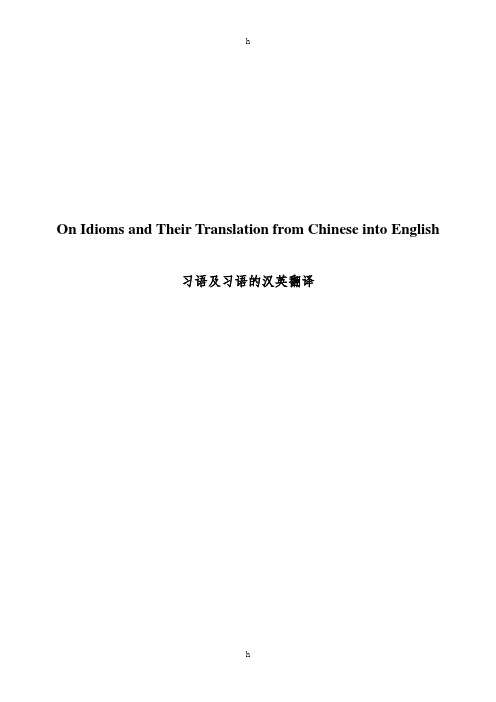
On Idioms and Their Translation from Chinese into English习语及习语的汉英翻译AbstractIdioms are just like incomparably resplendent bight pearls emitting dazzling rays in the palace of literature. Throughout the ages, they animate the works of countless men of literature and writing. Idioms have fixed patterns and abundant connotations. Their vivid images explicitly convey incisive meanings. Chinese idioms are part of the essence of Chinese culture with a history of thousands of years. In this thesis, the English translation of Chinese idioms will be discussed on the foundation of simply introducing the definitions, origins, features, and classifications of idioms, and a series of principles and methods of idiom translation will be put forward, mainly involving the translation of the Chinese idioms which have similar and dissimilar implications in English.Key words:Chinese Idioms;Similarity;Dissimilarity摘要习语犹如文学殿堂里一颗璀璨无比的明珠放射着历久不衰的光芒,古往今来,无数文人墨客的笔下都闪耀着它的异彩。
10、习语翻译

2. Classification of English idioms:
Set phrase(固定词组):
Neither fish or fowl 非鱼非肉? “不三不四,不伦不类” Popular saying(俗语、惯用语):
All your swans are geese 敝帚自珍 Famous phrase(警句):
These pumps are featured by their simple operation, easy maintenance and durable service.
这些水泵的特点是操作很简单,维修很方便,而 且很耐用。
这些水泵的特点是操作简单,维修方便,经久耐 用。
Some old people are oppressed by the fear of death. In the young there is a justification for this feeling. Young men who have reason for fear that they will be killed in battle may justifiably feel bitter in the thought that they have been cheated of the best things that life has to offer.
俗语(common saying;folk adage):
特点是通俗化、口语化,有一定的形象比喻
惯用语(idiom):
汉语中的惯用语以三音节结构为主,其特点是多 半用于转义。
谚语(proverb):
语义相对完整的固定句子。最大特点是跟人民群 众的生活密切相关。谚语是人民社会生活经验的 结晶,含义深刻;俗语的意义比较浅显,所用比 喻多为一般现象,不是经验的总结。
常见中文习语的翻译

1. 铁石心肠cruel and unrelenting2. 置死地于后生 a v igorous and manly exertion3. 千秋功业a great unde rtaking of lasting importance4. 安居乐业liv e in peace and w ork happily5. 骨肉分离family separation6. 各得其所be prope rly prov ided for7. 众议纷纭disagree on8. 岁月不居,来日苦短Time does not stay is brief is the day.9. 夜长梦多A long delay may mean trouble.10. 时不我与Time and tide w ait for no man.11. 依时顺势keep up w ith the tide12. 日渐没落being pushed out of business13. 鹬蚌相争play A off against B14. 浩然之气noble spirit15. 凤毛麟角a rarity of the rarities16. 望而生畏stand in aw e before17. 敬而远之keep respectfully aloof from18. 众矢之的in the do ck19. 毫无瓜葛be div orced from20. 尔虞我诈sheer cunning and falsehood21. 备受推崇be rew arded and respected22. 善有善报,恶有恶报the good inev itably is successful and the bad inev itably punished23. 其乐融融sw eetness and light24. 义无反顾feel obliged to25. 物美价廉attractiv e in price and quality26. 源源不断keep flow ing in a steady stream27. 滚滚不息pour into28. 福祉w ell-being29. 精华quintessence30. 阴霾specter31. 势不两立pit sth against sth32. 打折扣w ear thin / w ater dow n33. 大展宏图score big points34. 重整旗鼓shock sth ba ck to life35. 不谋而合coincide w ith36. 染指dip one’s f inger in37. 博大精深both extensiv e and profound38. 源远流长long-standing and w ell-established39. 诸子百家the masters’ hundred schools40. 天下为公A ll under heav en are equal.41. 天下兴亡,匹夫有责Ev er y body is responsible for the fate of his co untry.42. 吃苦耐劳bear hardships43. 勤俭持家frugality in household management44. 尊师重教respect tea chers and v alue education45. 当务之急highest prio rity46. 遭受重创take a heavy toll47. 先见之明pre scient mov e48. 奇园古宅exotic gardens and old mansions49. 衣食住行clothing, food, shelter a nd transpo rtation50. 信誓旦旦be poised to。
四字成语带翻译

四字成语带翻译1.祸起萧墙:祸乱发生在家里,比喻内部发生祸乱。
2.积重难返:指长期形成的不良风俗、习惯不易改变3.集腋成裘:狐狸腋下的皮虽然很少,但是聚集起来就能缝成一件皮袍。
比喻积少成多。
4.计日程功:可以数着日子计算进度,形容数着日子算进度,形容在较短期间就可以成功。
5.济济一堂:形容许多有才能的人聚在一起。
6.间不容发:中间容不下一根头发,比喻与灾祸相距极近,情势极其危急。
7.见仁见智:对同一问题,各人从不同角度持不同的看法。
8.见贤思齐:见到好的,优秀的,就向其学习,向其看齐。
9.矫揉造作:形容过分做作,极不自然。
10.矫枉过正:纠正偏差做得过了头11.金科玉律:比喻不能变更的信条或法律条文。
12.噤若寒蝉:形容不敢作声。
13.敬谢不敏:谢,推辞;不敏,无能。
表示推辞做某事的婉辞。
错用于拒绝别人的要求14.久假不归:长期借去,不归还。
15.开卷有益:读书就有收获。
开卷,打开书本,借指读书。
16.恪遵功令:严谨地遵守条令制度。
17.空穴来风:有了洞穴才有风进来,比喻消息和传说不是完全没有原因的。
18.苦心孤诣:费尽心思钻研或经营。
孤诣,别人所达不到的。
(中性)。
19.狼奔豕突:狼和猪东奔西跑。
比喻成群的坏人乱窜乱撞。
(贬)。
20.良莠不齐:一群人中有好有坏,侧重于品质。
不用于水平、成绩等。
21.临渊羡鱼:比喻只有愿望,不去实干,就无济于事。
22.令人发指:发指,头发竖起来,形容非常愤怒。
23.另眼相看:用另一种眼光看待,多指看待某个人(或某种人)不同于一般。
24.门可罗雀:大门前面可以张网捕雀,形容宾客稀少,十分冷落。
25.门庭若市:形容交际来往的人很多。
26.面目全非:事物的样子变得很厉害,贬义.指变得很糟。
27.目无全牛:用来形容技艺已达十分纯熟的地步。
(褒义词)28.沐猴而冠:沐猴戴帽子,装成人的样子。
比喻装扮得像个人物,而实际并不像。
29.暮鼓晨钟:比喻可以使人警觉醒悟的话。
30.南辕北辙:心里想往南去,车子却往北走。
- 1、下载文档前请自行甄别文档内容的完整性,平台不提供额外的编辑、内容补充、找答案等附加服务。
- 2、"仅部分预览"的文档,不可在线预览部分如存在完整性等问题,可反馈申请退款(可完整预览的文档不适用该条件!)。
- 3、如文档侵犯您的权益,请联系客服反馈,我们会尽快为您处理(人工客服工作时间:9:00-18:30)。
习语的译法
习语是经过长时间的使用而提炼出来的固定短语或短句,大都具有鲜明的形象,适宜于用来比喻事物,因而往往带有浓厚的民族色彩和地方色彩。
翻译时,译者除了忠实地表达原文习语的意义外,还应尽可能的保持原文习语的形象比喻、丰富联想、修辞效果以及其民族、地方特色等。
我们这里所谈的英语习语(idioms)是就其广义而言的,包括俗语(colloquialisms)、谚语(proverbs)、俚语(slang expressions)等。
习语的英译汉有三种主要方法:一、直译法;二、汉语同义习语的套用法;三、意译法。
一、直译法
在不违背译语语言规范以及不引起错误的联想的条件下,在译文中保留原语比喻、形象和民族、地方色彩的方法。
Armed to teeth 武装到牙齿
Sour grapes 酸葡萄
The heel of Achilles 阿基里斯的脚踵
A cat has nine lives 猫有九命
Blood is thicker than water 血浓于水
二、汉语同义习语的套用法
有时英语习语和汉语同义习语在内容和形式上都相符,双方不但有相同的意义和修辞色彩,并且有相同的或大体相同的形象
比喻。
在英译汉时我们如遇到这样的情况,不妨直截了当地套用汉语同义习语。
To fish in troubled waters 浑水摸鱼
To add fuel to fir 火上加油
To be on thin ice 如履薄冰Walls have ears 隔墙有耳Strike while the iron is hot 趁热打铁
To spend money like water 挥金如土
At sixes and sevens 七上八下
One boy is a boy, two boy half a boy, three boys no boy
一个和尚挑水吃,两个和尚抬水吃,三个和尚没水吃。
三、意译法
如果不可能或没有必要用直译法保留英语习语的表达形式,并且在汉语中也找不到合适的同义习语可供套用,就得用意译法配合上下文把英语习语的含义表达出来。
1)Among so many well-dressed and cultured people, the country girl felt like a fish out of water.
同这么多穿着体面而又有教养的人在一起,这位乡下姑娘感到很不自在。
2)She was born with silver spoon in her mouth; She thinks she can do what she likes.
她生在富贵之家,认为凡事都可随心所欲。
(一)汉语和英语中有很多习语反应各自的民族或地方色彩,英译汉时一方面应当注意保存这些特色,另一方
面应当注意不要用汉语中具有民族、地方特色的习语
硬套英语的习语,以免把汉语的民族或地方特色强加
到译文中去,以致和原作的上下文形成矛盾。
Two heads are better than one.和汉语习语“三个臭皮匠胜过诸葛亮”虽然有相同的意义,但在英译时决不应套用后者。
(二)有些带有浓厚的民族色彩、地方色彩或具有典故性的英语习语,译成汉语时必须加注才能交待清楚原意。
To carry coals to Newcastle译为“运煤到纽卡索,多此一举。
”还是不够的,必须加注。
(三)英语习语常常以缩略的形式出现,如Jack of all trades and master of none (杂而不精的人) 缩略为Jack of all
trades ,含义不变;If you run after two hares, you will
catch neither (脚踏两只船,必定落空) 可缩略为to run
after two hares, 含义也不变。
It’s no use crying over
spilt milk(作无益的后悔)可缩略为to cry over spilt
milk, 含义也不变。
译者必须首先熟悉这种英语常用习
语并注意其简化现象,才能为英语简化习语的汉译创
造条件。
1)“well, it’s the old story of the stitch in time,”he said. “Y our
politicos could have got the weird little bastard with no trouble early on, but they didn’t. Now they have problems…”
“嗯,还是那句老话:及时缝一针,可以省掉九针,”他说。
“你的那班政客要是早下手,本来可以轻而易举的把这个不可思议的小杂种干掉的,可是他们不动手。
现在他们遇到难题了……”
(四)有时候,英语原文虽然没有用习语,但在一定上下文中,在忠实于内容和总的风格的前提下,可以把英语
原文中的非习语译为汉语的习语,使译文生动有力。
1)But against the vast expanse of the sky, the chute looked very small.
但和广袤无垠的太空相比,降落伞看起来是沧海一粟。
2)The mere thought of the appearing before a crowd frightened me.
只要一想到要在大庭广众之前露面使我胆战心惊。
